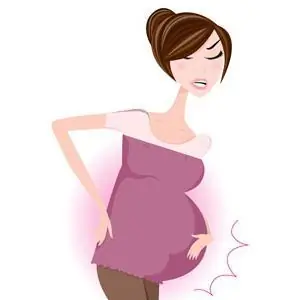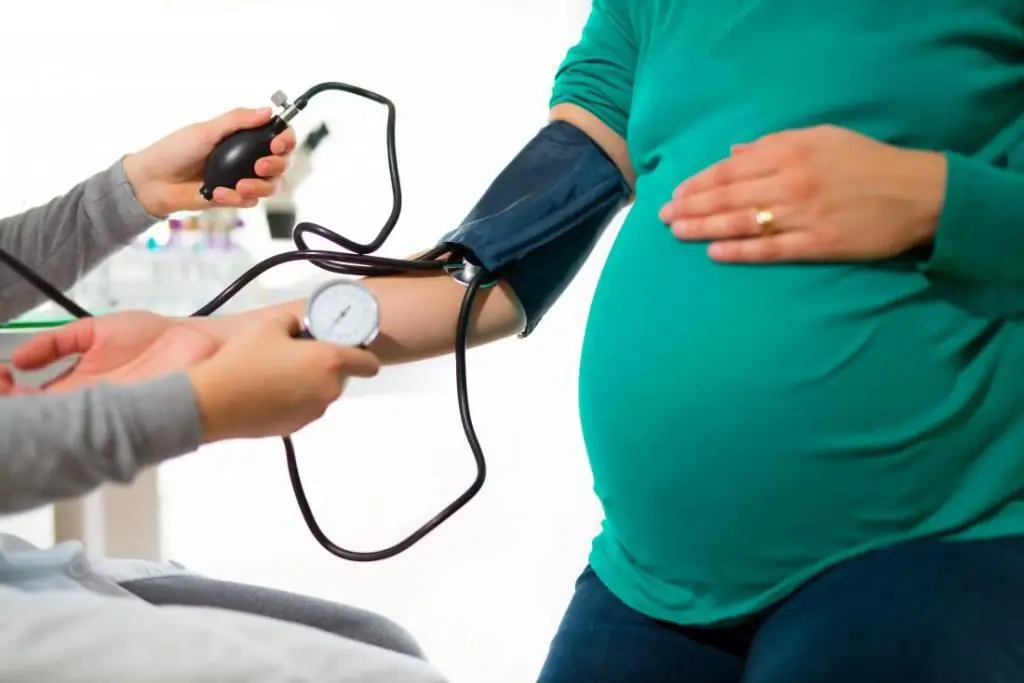2026 Author: Priscilla Miln | miln@babymagazinclub.com. Last modified: 2025-01-22 17:55:19
The news of pregnancy becomes a time of change in every woman's life. In addition to the joyful expectation, revision of all her plans, cheerful troubles, the task of bearing and giving birth to a he althy baby falls on her shoulders. Proper nutrition, giving up bad habits, regular visits to the antenatal clinic, avoiding nervous situations - many ladies have heard about this long before two strips on the test. However, there is a silent threat to the life of the mother and fetus, which most women who have seen the tonometer only at medical examinations are not aware of. Every expectant mother needs to know her blood pressure during pregnancy. Deviations in blood pressure, which in an ordinary person cause only malaise, can be fatal for a pregnant woman. But forewarned means forearmed, so in this article we will consider the signs and causes of pathological pressure in expectant mothers, as well as methods of dealing with them.
Normal pressure during pregnancy
Blood pressure is one of the main diagnostic indicators of a person. The heart, by its contractile activity, creates it in large arteries, due to which the blood fully saturates the tissues and organs with oxygen and nutrients. There are two parameters for measuring blood pressure - systolic (upper) and diastolic (lower). In a he althy person, the normal pressure range varies between 100/60 - 140/90, but 110/70 - 120/80 is considered optimal. It is these numbers that allow the body to stably maintain an active metabolism in its cells.

In a future mother, the normal pressure should remain approximately at the same level as in a non-pregnant state, but hormonal changes in the female body can make their own small adjustments. If a woman before pregnancy had a tendency to increased (hypertension) or decreased (hypotension) pressure, then this fact should be taken into account and be under the supervision of a gynecologist and cardiologist from the moment of registration. In this case, the pregnant woman should be aware of what pressure indicators are normal for her, and follow all the doctor's recommendations.
Methods of measuring pressure
In order to know your normal blood pressure level, you should have a tonometer in your first-aid kit. The most common types of blood pressure monitors are mechanical and electronic. If you do not have the skills to work with a mechanical tonometer, it is better to buy an electronic one. Despite the cost, an electronic blood pressure monitor is much simpler and more convenient to use.use, you will be able to measure yourself without assistance.

Measuring pressure should be in a calm environment, it is better to sit for a few minutes and relax before that. The arm and the tonometer should be placed to your right on the table, not above the level of the heart, so as not to disturb the blood circulation in the limbs. The cuff must be fixed on the forearm and further actions must be performed according to the instructions of the tonometer. It is best to monitor blood pressure every day at the same time, and record the values for yourself and the doctor.
Pressure can increase after physical exertion, eating, certain medications, under the influence of stress. There is such a phenomenon in medical practice as “white coat syndrome” - a condition when an absolutely he althy person, at the sight of medical workers, has an increased pulse and pressure, anxiety appears. The expectant mother, taking regular measurements, knows what pressure during pregnancy is the norm for her, regardless of various life situations.
The female body during the period of expectation of the baby may behave somewhat differently than usual. Often in the early stages of pregnancy, the pressure decreases, and this is not a deviation. As soon as the hormonal background improves - usually by the end of the first trimester - the pressure also returns to normal.
However, if the tonometer displays numbers much higher than the usual values, a pregnant woman should be seriously worried. High blood pressure at any timeexpecting a baby is a dangerous sign of a malfunction in the body and requires urgent medical advice.
Low blood pressure in expectant mothers
A he althy person has low blood pressure below 100/60. If he is not prone to hypotension, then in this case his body will get tired faster, feel weak, unwell, up to loss of consciousness and the need for medical assistance.
During pregnancy, blood pressure lowering has slightly different mechanisms of action. The first trimester is often accompanied by toxicosis, fainting, weakness. The reason for this is a change in the hormonal background, which also contributes to low pressure during pregnancy. This condition is physiological and in the vast majority of cases does not pose a danger to the mother and fetus. With the beginning of the second trimester, the volume of circulating blood increases, and the pressure returns to normal numbers. But the expectant mother should be aware of the signs when low blood pressure poses a threat to the normal course of pregnancy and she should urgently see a doctor:
- feeling much worse;
- constant weakness;
- severe headaches appeared;
- often worried about dizziness, nausea and vomiting;
- pressure level does not rise steadily above 90/60.

Undoubtedly, each of these signs can be a consequence of banal toxicosis, but regular monitoring of pressure will help to take care of your he alth more carefully. Pathologicallylow blood pressure during pregnancy can cause circulatory disorders in the placenta and early fetoplacental insufficiency, which can lead to fetal hypoxia and developmental delay. Insufficient blood supply to the uterus can result in preeclampsia for a pregnant woman, weak labor activity in the future.
Reason for lower pressure
Hypotension in expectant mothers can cause:
- hunger;
- lack of sleep;
- stress;
- low body weight;
- sedentary lifestyle;
- ARVI;
- hypotension before pregnancy;
- physical overwork;
- general diseases of the body, etc.
It should not be forgotten that constant low blood pressure during pregnancy can cause collapse (sudden cardiovascular failure with depression of consciousness up to its loss), due to which serious pregnancy complications can occur. Also, the syndrome of the inferior vena cava is often encountered, when the position of the expectant mother lying on her back causes compression by the uterus of this very vein and worsens the nutrition of the fetus. At the same time, a woman may feel clouding of consciousness, tinnitus, dizziness. This syndrome is typical for later stages of pregnancy, when the fetus becomes heavier. The best sleep for good work of the heart and blood vessels is on the left side.
Hypotension symptoms
Low blood pressure during pregnancy is shown by the following signs:
- weakness;
- drowsy;
- dizziness;
- fatigue;
- lack of air;
- tachycardia;
- shortness of breath on exertion;
- tinnitus and darkening of the eyes, especially with a sudden change in body position;
- fainting.
Usually, to eliminate the above symptoms, it is enough for a pregnant woman to lie down, put a roller under her feet, drink sweet weak tea, wash with cool water - to increase blood flow to the head.
Treatment and prevention
A future mother should not self-medicate if her condition is seriously affected by low blood pressure - all medications and therapy should be prescribed strictly by a doctor. Many drugs are prohibited during pregnancy because they have a teratogenic effect on the fetus, which is especially fraught in the early stages, for which hypotension is most typical.
For most pregnant women, to increase pressure, it is enough to follow simple rules of the daily routine, nutrition, physical activity. For example:
- observance of the daily routine;
- diet mode. You should also take something sweet with you (chocolate, fruit) in order to increase blood glucose levels or have a banal snack if you feel unwell;
- full sleep: it is better to open the window at night for fresh air access, and in the morning lie down a little before getting up so that a sudden change in body position does not provoke pressure surges;
- daily walks;
- avoiding stressful situations;
- do not allow long standing in one place;
- adequate physical activity;
- regular ventilation of premises;
- volumeat least 2 liters of water drunk per day (in the absence of edema).
Foods that increase blood pressure
A woman to normalize low blood pressure during pregnancy can include in her diet foods such as:
- s alty foods: fish, bacon, nuts, etc. But you need to remember that a large amount of s alt is harmful to the body and can provoke swelling during pregnancy, so you should not abuse them;
- some fruits: lemons, grapefruits, carrots, black currants;
- beef liver;
- cheese;
- butter;
- tea, coffee (weak);
- fatty fish;
- sweets.

Doctors observe a frequent relationship between low blood pressure during pregnancy and anemia, which can be tracked by blood tests. Some foods that help increase blood pressure (such as beef liver) also help normalize hemoglobin levels.
High blood pressure in pregnant women
During the second trimester of pregnancy, the uteroplacental circulation is formed, the volume of blood increases, the productivity of the heart, and therefore, the level of blood pressure may slightly increase, but not higher than 120/80. If a pregnant woman who does not suffer from hypertension keeps numbers 30 units higher for systolic and 15 units higher for diastolic pressure, you need to call an ambulance or see a doctor. High blood pressure during early pregnancy poses a serious danger to the motherand the fetus: the walls of the vessels narrow, the organs are worse supplied with blood, including the placenta. If the process is not taken under control, intrauterine growth retardation, fetoplacental insufficiency, placental abruption may develop.
Reasons for rising pressure
A woman may have he alth problems that complicate pregnancy:
- hypertension;
- overweight;
- diabetes mellitus;
- stress;
- kidney disease;
- bad habits;
- hormonal failure;
- heredity.
It is not uncommon for a woman who has never had he alth problems to face high blood pressure during late pregnancy. This comes as a complete surprise to her and is usually discovered by chance at a doctor's appointment. What are the signs of high blood pressure?

High blood pressure symptoms
When these signs are detected, a pregnant woman must definitely seek medical help at a clinic or hospital, often therapy with droppers and drug injections is required to normalize the condition:
- feeling worse;
- headache;
- tinnitus;
- visual impairment, the appearance of "flies";
- palpitations;
- nausea, vomiting;
- skin hyperemia.
Often, high blood pressure occurs without symptoms, a woman does not even suspect that at any moment she and her unborn baby can be overtaken by a dangerous condition calledpreeclampsia.
Preeclampsia
Preeclampsia is a complication of pregnancy that has the following triad of main features:
- high blood pressure;
- edema;
- proteinuria (protein in the urine).

Preeclampsia is also called late toxicosis of pregnant women. As a rule, it manifests itself in the second or third trimester, diagnosing it in the first months of waiting for a baby often has an unfavorable prognosis. Preeclampsia is considered the main cause of death of pregnant women and women in childbirth in developed countries, significantly increasing perinatal mortality. If measures are not taken in time, preeclampsia can turn into preeclampsia (increased blood pressure over 160/100, severe edema, the amount of protein in the urine is from 5 g per day, symptoms of CNS damage, thrombocytopenia, jaundice, etc. appear) and eclampsia (convulsions join and there is a real threat to the life of the pregnant woman and the child). The expectant mother should be aware of this condition, she should measure her blood pressure every day, take a urine test once every one to two weeks, and monitor swelling. In case of any deviations, you should inform your doctor about them and continue to use his recommendations. Preeclampsia is by no means a fatal condition, it quite often accompanies high blood pressure during late pregnancy and, with proper supervision, has a successful outcome. In subsequent pregnancies, the likelihood of preeclampsia may be higher than in women who have never encountered it before, but the fact of its repetition is not necessary.
Prevention measures for high blood pressurepregnant women
Tonometer shows high blood pressure during pregnancy. What should a future mother do? Even with a single increase in pressure, you need to inform your doctor. You should have a blood pressure medication recommended by your doctor with instructions for taking it in your first-aid kit. Not all antihypertensive drugs are allowed during pregnancy, so only a doctor can prescribe them.
There are simple rules that will help a pregnant woman with high blood pressure:
- day routine;
- normalization of nutrition. Spicy, spicy foods, smoked meats, pickles, cheese, butter, strong tea, coffee, chocolate, energy drinks, etc. should be excluded from the diet;
- sleep with the window open;
- outdoor walks;
- stress reduction;
- avoid sedentary lifestyle;
- control the level of water you drink.
Foods that reduce blood pressure
There are products that have an antihypertensive effect:
- cranberry juice;
- beetroot juice;
- bananas;
- spinach;
- garlic;
- baked white potatoes;
- skimmed milk, etc.

High pressure cannot be “tolerated”, letting the situation take its course means creating a real danger to the he alth of mother and baby. But knowing the simple rules of behavior with high blood pressure will help a pregnant woman take control of the situation in time and give birth to a he althy baby on time.
Recommended:
Cutting pain in the lower abdomen during pregnancy: causes. Drawing pain during pregnancy

During the period of bearing a child, a woman becomes more sensitive and attentive to her he alth and well-being. However, this does not save many expectant mothers from pain
How to reduce or increase blood pressure in pregnant women?

Most often, high blood pressure in pregnant women occurs after 20 weeks. At this time, the volume of blood increases significantly, which complicates the work of the heart. Particular attention should be paid to the he alth of women with various complications of pregnancy, overweight, diseases of the kidneys or other organs
Low blood pressure during pregnancy: what to do, what to take? How does low blood pressure affect pregnancy?

Every second mom has low blood pressure during pregnancy. What to do, we will analyze today. Most often this is due to hormonal changes. From the first days in the body of a woman, progesterone is produced. This causes a weakening of vascular tone and a decrease in blood pressure. That is, it is a physiologically determined phenomenon
How to lower blood pressure during pregnancy. Drugs that lower blood pressure during pregnancy

High or low blood pressure during pregnancy is unfortunately not uncommon. The difficulty is that during this crucial period you can not drink the usual medicines. You can increase or decrease the pressure during pregnancy with the help of folk remedies
Hypotension during pregnancy: possible causes, symptoms, treatment, normal pressure during pregnancy, advice and recommendations from a gynecologist

What is hypotension during pregnancy? Is it a simple ailment, or a severe pathology that requires immediate medical attention? That is what we will talk about today. During the period of bearing a baby, every woman is faced with various ailments, because the body works "in three shifts", and gets tired in order. At this time, chronic diseases are exacerbated, and "sleeping" ailments are awakened, which could not be suspected before pregnancy

